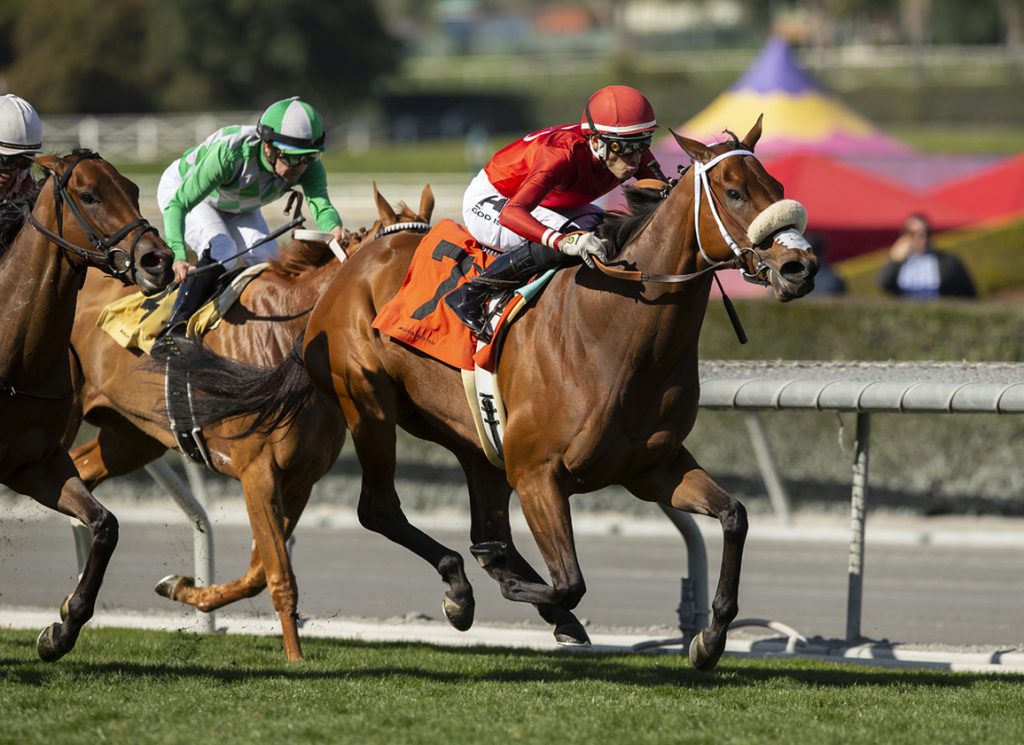Norwegian playwright Henrik Ibsen believed the strongest man in the world is one who stands alone.
“My father never wanted to complicate things, so he never really wanted another partner,” explained Tim Cohen of his beloved father Jed, the much-missed scion of the Cohen clan, whose paprika-dusted silks have been carried with rare aplomb in recent years under the family’s Red Baron’s Barn and Rancho Temescal banner.
“I’d have clients at the farm or friends, and they’d go, ‘Gosh man, you’re doing great. Can we buy into a horse with you?’ And I’m like, ‘Love to, but I can’t,’” he added, highlighting the stable’s winning formula, honed to an audacious point, of purloining horses with latent talent from across the pond.
But as Cohen sees it, the industry’s economics are putting the monolithic ownership experience on an unrealistic trajectory, making the collaborative one its increasingly inevitable alternative.
That, and Ibsen with his tufty-white mutton chops was never exactly known as the life of the party.
“The intent is to really get people into a marketplace that they would otherwise find very hard to enter or duplicate,” said Cohen, about why he is sunsetting the family’s nom de course and replacing it with Rancho Temescal Thoroughbred Partners (RTTP), a bespoke ownership venture, formally unveiled last week, in tandem with his long-time associate, Kentucky-based bloodstock agent Joe Miller.
When it comes to launching new ventures, Cohen’s muscle memory should stand him in good stead.
More than 20 years ago, his family purchased a 6,000-acre plot of land in California’s Ventura County, transforming a cattle ranch and oil field into a sprawling tangle of fruit groves, emerald pastures and a horse farm.
A former luxury hotel manager, Cohen was plunged into an agrarian crash-course of soil management, growing cycles, climate and water conservation.
Cohen’s new partnership shouldn’t require the same degree of autodidacticism–yes, that is a word–nor the same amount of dirt beneath the fingernails. But it hardly follows the typical syndicate blueprint.
At $100,000 a pop, Cohen is selling a maximum 30 shares in a Limited Liability Company (LLC), an upfront payment that covers all purchase costs and training fees. Roughly three years later, the LLC will be dissolved with proceeds distributed accordingly. A new LLC will launch every year.
“You’re not buying into a horse, you’re buying into a company,” said Cohen. “That company is going to acquire the horses.” No more than ten horses per LLC in fact.
Twenty shares have already been snapped up. With the bulk of the investors so far West Coast-centric, Cohen said to expect continued patronage of the stable’s current pool of Californian training talent, the likes of Jeff Mullins, Mark Glatt, Bob Hess, Leonard Powell. But the venture has its eyes on nationwide horizons.
“It’s not a dictatorship, it’s collaborative,” he said. “Right now, nobody’s excluded. I think if one trainer had a bunch of clients jump in, then obviously some of those horses would be going their way.”
Cohen stressed the residual benefits to an up-front payment model. No excessive mark-ups, for one. The team can also wield financial elasticity when scouting for talent, a useful shield against the hot flames of a bidding war.
“When a horse becomes available, you need to be able to purchase it right away,” said Cohen. “You can’t wait to purchase it then raise the money and hope the horse is still available.”
Miller agrees. “A lot of times we’ve made offers on horses minutes after they run,” he said.
One that comes to mind, said Miller, is Quattroelle (Ire) (Mehmas {Ire}), who cut a Moses-like swath through the field to claim the GIII Megahertz S. at Santa Anita earlier this month.
“Tim and I made an offer on her within 10 minutes of her crossing the finish line when she ran third,” said Miller, of the horse’s debut at Leopardstown in August of 2020.
Cohen and Miller’s forays into European sales rings have historically yielded results. The stable’s Grade I winner River Boyne (Ire) (Dandy Man {Ire}), for example, was purchased for five figures at Tattersalls Autumn Horses in Training sale in 2017. Looking ahead though, private sales, it seems, will likely constitute the team’s phalanx of attack.
Miller lauds “a very good network of trainers that I speak with very frequently” as a backbone of this strategy, supplemented by a network of busy bees.
“We really do our due diligence, a lot of research, spending time with the horses before buying them privately, watching them train,” said Miller, championing the working relationships he’s forged with Euro-based bloodstock agents Alastair Donald and Charlie Dee.
That said, “if an outside agent finds a horse that they think would suit us, they’re welcome to present us with that horse,” he said. “There are a lot of great agents out there with a great eye.”
So, what type of horse gets the blood pumping? For one, “fillies with a little bit of pedigree, with a little bit of residual value,” said Miller. “If they’re the right physicality, they can have a lot of value at the end of their career to go on to be a broodmare.”
Runners without the necessary on-track seasoning don’t typically cut the mustard. “We like to see them run several times and show progression in the right direction.”
In terms of physicality, “we specifically like very good-looking horses that are going to go on firm ground, what we think are on the improve, and have a turn of foot,” he said.
They also need the constitution and fortitude to train “day in, day out” over America’s deep dirt tracks, he said. Horses with a strong hind-end are desirable. “And you need a hip to it,” he said, “a bit of a shoulder.”
Smaller horses aren’t necessarily looked over. “But they have to be very, very well balanced,” he said. “And they have to have some scope.”
If the horse couldn’t cut it as a yearling, said Miller, “a lot of times we’re not really going to want to buy it as a racehorse either, no matter what their record is.”
When it comes to RTTP’s one-and-your-done payment method, Miller has had prior experience in other syndicates built around a similar model.
“It seems to work for people who don’t want a monthly bill. You write one check and you get a check back at the end,” he said. “It wasn’t for everybody, but it did seem to work for a lot of people.”
Goals are lofty–or rather, they remain so.
Front and center of last week’s press release was an impressive set of numbers illustrating Red Baron’s Barn and Rancho Temescal’s recent big race clout: over the last three years, 27 of the stable’s horses have either won or placed in stakes company.
“We want to keep winning stakes. We want to get people in the winner’s circle at Santa Anita, Del Mar. Really, everywhere,” he said.
Another key aim of the partnership, said Miller, is to remove so many of the obstacles littering the way to the winner’s circle.
“People always have setbacks. It’s just not easy to get your horse to the races,” he said, calling the long road to the racecourse “the hardest part” for owner-breeders especially.
“Our horses have already made it to the races, and we have a very reasonable expectation that they are going to be running right off the plane for us. Most of the time they do so successfully,” said Miller.
“We just want people to have a lot of fun, some immediate action,” he added. Immediate action, and–in news welcome to any frugal investor with one eye on their checkbook–“we do want to be fiscally responsible about it.”
The post Cohen, Miller Ownership Venture “Fun, Immediate Action” appeared first on TDN | Thoroughbred Daily News | Horse Racing News, Results and Video | Thoroughbred Breeding and Auctions.








